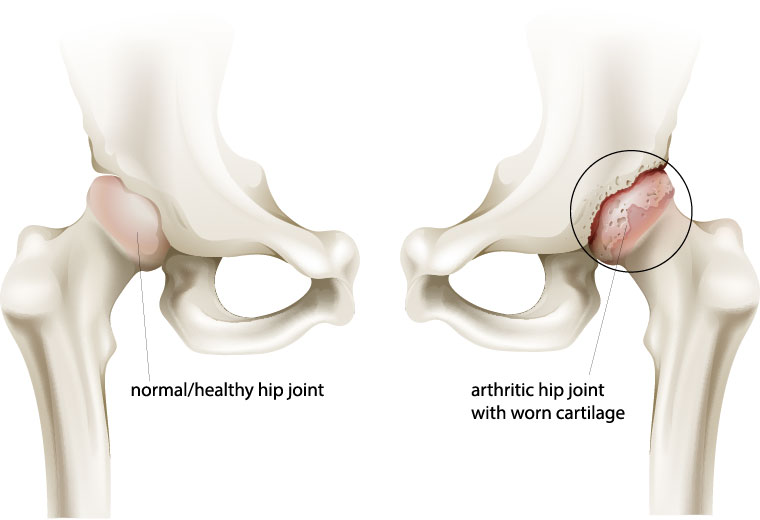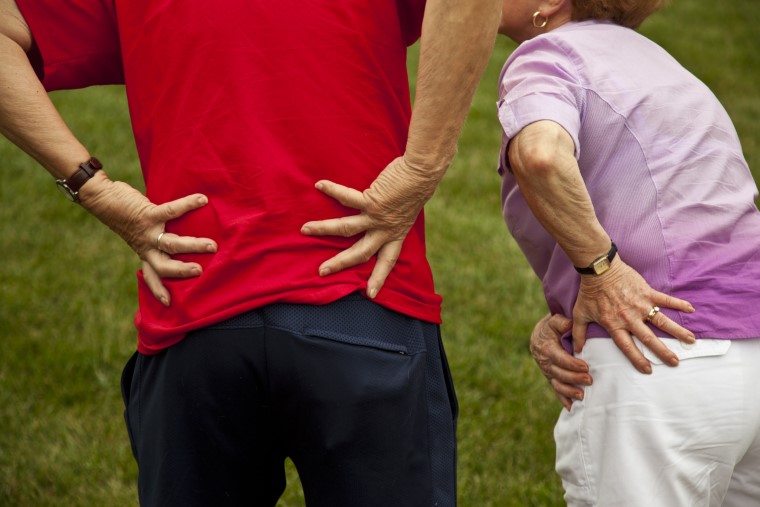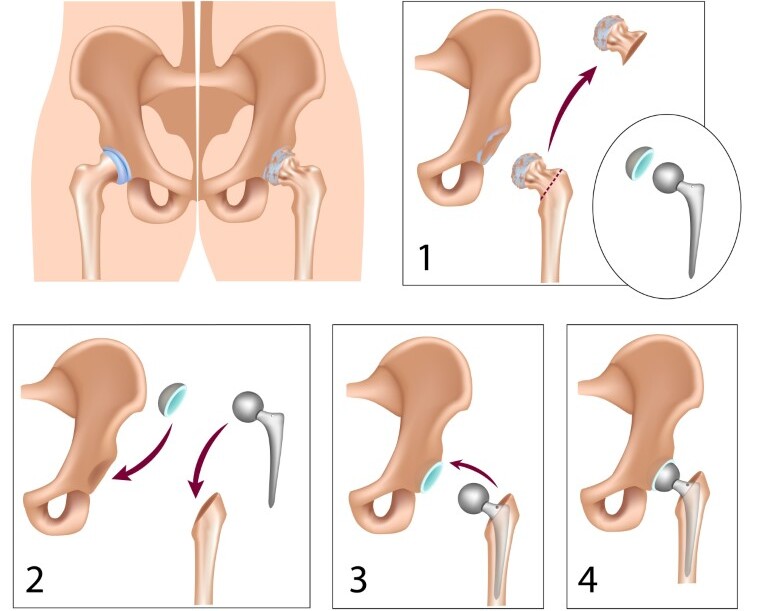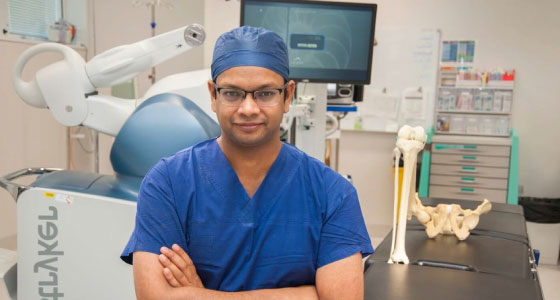Hip arthritis is one of the most common causes of hip pain and the condition can often worsen over time, affecting your mobility and quality of life. Unfortunately, there is currently no cure, but with the correct treatments, there are ways to lessen pain and prevent further damage.
If you’re suffering from pain and discomfort and in need of hip arthritis treatment in Melbourne, you should contact the team at MOATI today. Dr Chandrasekaran is a specialist when it comes to dealing with hip pain and will provide you with a number of different options.
What is hip arthritis?
Hip arthritis is inflammation of the hip joint that causes pain and stiffness..There are several causes of hip arthritis and diagnosing the cause, will determine the treatment required.

The worn cartilage in an arthritic hip joint will cause chronic pain and significant discomfort as the bones rub against each other.
Causes of hip arthritis
Your hip pain may be due to hip arthritis or chronic swelling and inflammation in the joint. Arthritis may occur following damage to the joint (post-traumatic), wear and tear (osteoarthritis) or generalised inflammatory conditions (such as rheumatoid arthritis). In some cases, it can also be a result of childhood hip problems like hip dysplasia.
Post-Traumatic Hip Arthritis
Post-traumatic hip arthritis occurs when a broken or fractured bone extends into the joint space, causing the surface to become uneven. This may abnormally load the cushioning cartilage causing it to wear down.
Hip Osteoarthritis
Primary osteoarthritis is associated with commonly associated with ageing. It’s a degenerative joint disease that can affect a number of areas but the hips are the most commonly affected joint. The cushioning cartilage at the end of the bone may have worn down, causing pain and friction as the bones rub against each other.
Rheumatoid Arthritis
Rheumatoid arthritis is an autoimmune and inflammatory disease that attacks healthy joints and causes a person’s immune system to damage them with uncontrolled inflammation. Rheumatoid Arthritis affects mainly joints in the hands and feet but hips can also suffer the same symptoms.
What are the symptoms of hip arthritis?
Regardless of which type of hip arthritis you are suffering from, you’re likely to experience some of the following:
- You notice pain in the groin area (that may also be felt in the outer thigh or buttocks)
- Joint pain and stiffness
- Reduced range of motion
- Crepitus (an audible cracking sound)
- Weakness in the hip
- Difficulty walking
- Pain that increases with vigorous activity

Arthritic symptoms generally include swelling and pain or tenderness in one or more joints.
How is hip arthritis diagnosed?
There are a number of different steps when it comes to diagnosing arthritis of the hip. As discussed earlier, an accurate diagnosis is vitally important. The evaluation will likely include the following:
- Patient interview to discover your medical history, symptoms etc.
- A physical examination
- Radiograph or X-rays
- MRI scan
- Ultrasound
- Blood tests if necessary
What is the best treatment for hip arthritis?
The best treatment for the hip will depend on the type of arthritis you are diagnosed with. However, all forms of treatment are designed to reduce pain and improve your quality of life. There are both surgical and non-surgical treatment options, all of which will be discussed with you during your consultation. Some examples of treatment are:
Non-operative
There are a number of different non-operative ways to treat hip arthritis:
- Weight reduction
- Limiting certain activities
- Use of walking aids
- Regular physical therapy
- Anti-inflammatory medication
- Joint supplements such as glucosamine
Operative
The following two surgical treatments can be performed:
- Hip replacement surgery
- Hip arthroscopy

This disease affects the tissue covering the ends of bones and if necessary you may be required to have a full replacement.
How is hip arthritis surgery performed?
If it is decided that surgery is the best option for you, there are two types of hip arthritis surgery:
- Hip replacement - the damaged cartilage and surfaces of the joint are removed and replaced with artificial prostheses.
- Hip arthroscopy - keyhole surgery of the hip joint, during which a small camera and instruments are placed inside the joint to perform corrective treatments.
Dr Chandrasekaran will discuss both options with you in more detail during your consultations.
How much does hip arthritis surgery cost in Melbourne?
The total cost for the procedure will depend on the procedure performed and your health fund benefits. There may be a known gap fee of $500 to $1000 but Dr Chandrasekaran’s staff will provide you with a breakdown of all potential costs and rebates.
If you decide to have your procedure in the public system, we can make all the necessary arrangements for you to have it at either the Alfred Hospital or Werribee Mercy Hospital at no extra cost. However, it’s important to note that there may be a waiting period.

When the root cause of osteoarthritis is known, it’s referred to as secondary osteoarthritis.
Why choose MOATI for hip arthritis treatments
We at MOATI understand how much hip pain can affect your everyday life and we do everything in our power to ensure we can help you alleviate it. We pride ourselves on our patient-centred approach to quality care and devise the best treatment plans suited to you and your needs.

Dr Siva Chandrasekaran
Dr Siva Chandrasekaran is a highly trained Orthopaedic Surgeon and specialist when it comes to treating hip arthritis. He has completed prestigious fellowships across the globe and has published over 50 articles on hip and knee replacement and hip arthroscopy.
FAQs
If you have any more questions regarding arthritis of the hip, please don’t hesitate to get in contact with us today. Below are our most frequently asked questions that may provide you with the additional information you require.
You are likely to feel pain and stiffness and a reduced range of motion in your hip. However, there are a number of other indications that you may be suffering from hip arthritis. Please see above for more information.
Hip arthritis causes inflammation of the hip joint which damages the surrounding cartilage.
Walking is one of the best forms of exercise, as it’s low impact and boosts blood flow to your cartilage.
Just because you have arthritis in one hip, doesn’t necessarily mean that you will get it in both hips. If you do though, it’s not common for the condition to affect both hip joints to the same extent and most of the time one is worse than the other.
The most common ways are overexertion, carrying out repetitive movements or trauma to the hip.
There are a number of ways to reduce pain and prevent symptoms from getting worse. These can include everyday activities such as improving your overall health and lifestyle, or in some cases, surgery is the best option.
